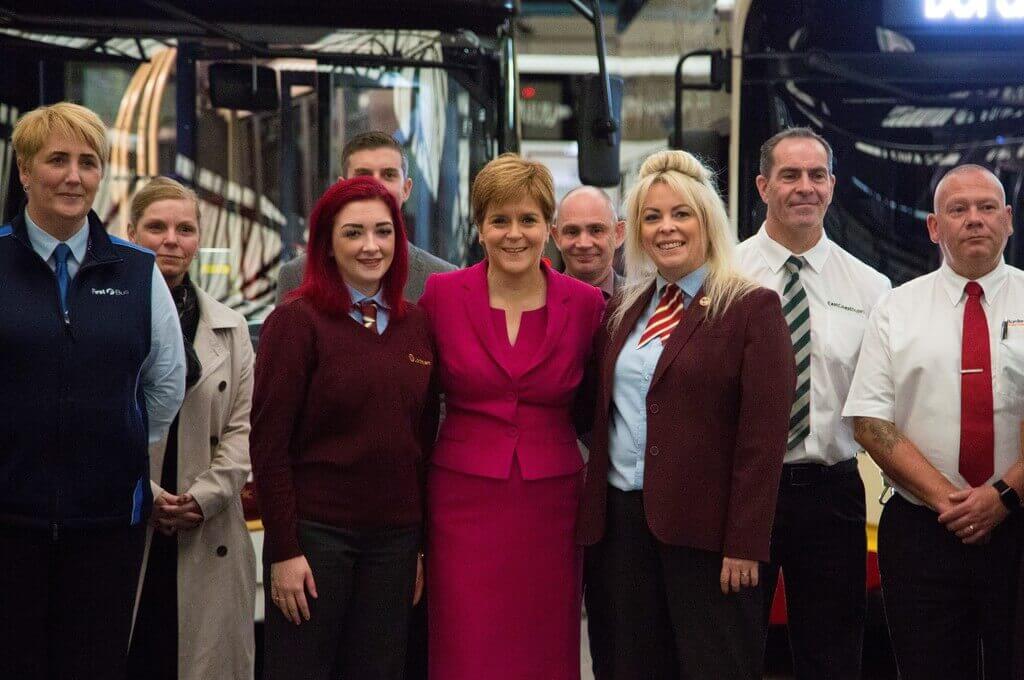In its 2019/20 Programme for Scotland, the Scottish Government has announced an investment of £500m funding for bus priority infrastructure as part of climate emergency measures to make buses in all towns and cities across Scotland ultra-low emission and carbon neutral. The programme is to be managed by Scottish local authorities, and delivered in partnership with bus operators.
Rt Hon Nicola Sturgeon MSP, First Minister of Scotland, laid out the Scottish Government ‘s plans for a greener future in the ‘Protecting Scotland’s Future’ document: “Transport is Scotland’s largest greenhouse gas emitting sector and this Programme for Government contains actions across all modes of transport.

“We will publish a new National Transport Strategy later this year which will redefine investment priorities to put sustainable transport at the heart of decision‑making and ensure that transport plays a key role in delivering net zero emissions by 2045.
“We will bring forward a step change in investment to make bus services greener and more punctual and reliable, so that more people make the choice to take the bus.
Our actions include:
- investing over £500 million in improved bus priority infrastructure to tackle the impacts of congestion on bus services and raise bus usage;
- beginning plans to reallocate road space on parts of the motorway network around Glasgow to high‑occupancy vehicles such as buses;
- working with the Scottish National Investment Bank, the bus sector and potential investors to explore the potential for new forms of innovative financing to radically accelerate the deployment of zero emission buses across Scotland. We are committed to phasing out new petrol and diesel cars by 2032. We have delivered 1,500 new electric charge points and supported business and communities to buy ultra-low emission vehicles (ULEVs). We will go further by:
- Providing an additional £17 million to support the demand for ULEVs through our Low Carbon Transport Loan scheme, while expanding the scheme to include used electric vehicles;
- Creating the conditions to phase out the need for all new petrol and diesel vehicles in Scotland’s public sector fleet by 2030, and phasing out the need for all petrol and diesel cars from the public sector fleet by 2025.”
The Confederation of Passenger Transport (CPT) Scotland said the government’s investment was “an investment in Scotland’s future” and would help people switch from the car to more sustainable bus travel.
CPT Scotland’s Director, Paul White, said: “We welcome the Scottish Government’s commitment to invest in improved infrastructure for buses. Congestion is the biggest issue holding back buses in our communities. Reducing journey times will make buses more attractive for customers, reduce the number of cars on our roads, improve local air quality and free up resources to deliver improved bus networks and better value fares.
“Every £1 invested in bus priority can generate up to eight times that amount in wider economic, social and environmental benefits. So, investment in buses is an investment in Scotland’s future. As such, it is fantastic to see buses at the heart of the Scottish Government agenda.”
Scottish bus operators have invested over £250million in new, greener vehicles in the past five years, but rely on local authorities to manage the road network.
Buses and coaches are responsible for only 5% of poor air quality in towns and cities, with around 50% attributed to cars. Moreover, pollution from all traffic is four times worse in congestion compared with free-flowing traffic.
You can read more news here: cbwmagazine.com/category/news

